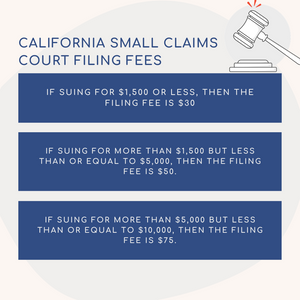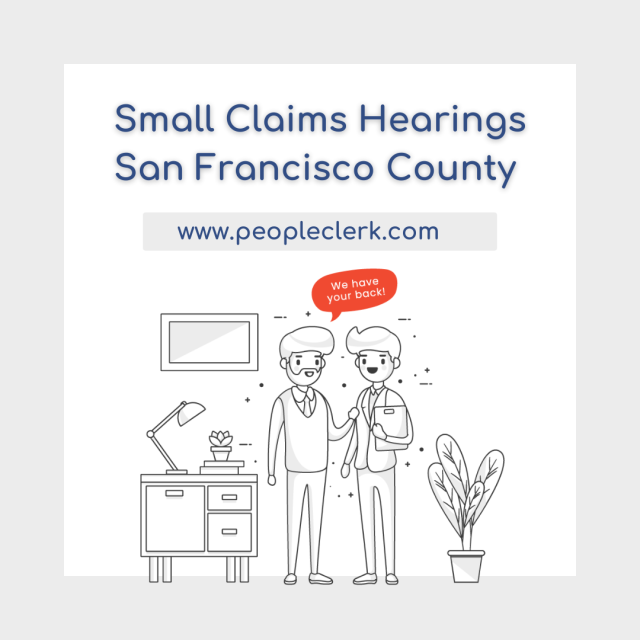People Clerk helps you with your small claims court lawsuit.
Get StartedContents
Do you want to know more about what a small claims hearing is like in San Francisco? Prepare yourself for the big day!
In this article learn about:
Background on San Francisco small claims
How to prepare before the hearing date
What to expect at the Small Claims Hearing
How to watch a live small claims hearing!
Small claims mediation
Background on San Francisco Small Claims Court
The maximum amount you can sue for
In San Francisco small claims, the maximum you can sue for is:
$12,500 if you are an individual
$6,250 if you are a business
Remember, the maximum you can sue for isn't determined by who you are suing but rather who is doing the suing. If you are owed more than the maximum, you are agreeing to waive that additional amount by suing in small claims. For example, if you were in a car accident and the damages to your car are $13,000, you can only sue for $12,500. You agree to waive the additional $500 in damages.
Filing Fees
The San Francisco small claims court filing fees depend on how much you are suing for. Generally, you will pay between $30- $75 to file the lawsuit.
Note: If you cannot afford to pay court fees, you can ask the court to waive the fees.
Read More: How to file your San Francisco small claims court lawsuit.

Serving Fees
Once the small claims lawsuit is filed, you have to notify the person you sued that they have been sued. This is called serving.
There are a few different ways to serve your small claims lawsuit:
You can have your friend serve your lawsuit. This is how you can serve your lawsuit for free (but you may have to buy your friend lunch!)
You can have the sheriff serve your lawsuit. It would have to be the sheriff in the county where the person you are suing is located. This tends to cost $40 but not every county offers this service. You have to call the sheriff's department in the county where the person you sued lives or works to confirm.
You can hire someone to serve your lawsuit. A process server is someone who has a license to serve lawsuits. The costs vary depending on the county but they generally cost between $75 to $150.
Read More:8 Tips on how to win your California Small Claims Lawsuit
If you win, you can request that the person you sued pay for your court fees and serving costs.
People Clerk will create a judge friendly evidence and receipt packet for you to take with you to the small claims hearing! Learn More.
What to Expect at the Small Claims Hearing
On the hearing day, you want to give yourself plenty of time to arrive at the courthouse, go through security, and find the courtroom. You don't want to be late! If you are late, the judge may close your lawsuit.
Once you are in the courtroom
Once the courtroom is opened, the court clerk, sheriff, and judge will go through what to expect. You will be sitting in a room with other people who have filed small claims cases. You will get to watch the cases scheduled before your case.
If both parties show up:
Right before the hearing, the judge will ask both you and the person you sued to show each other the evidence.
The Judge will ask you why you are suing.
Then the judge will ask the person you sued their side of the story.
The hearing will last around 15 minutes.
The judge will ask you to show the judge the evidence you brought with you. Sometimes the judge will keep the evidence. Otherwise, you will get the evidence right back.
Very rarely a judge will tell you who won or lost immediately after the hearing. Instead, the judge will tell you that their decision will be mailed to them (usually takes a few weeks to two months or so).
If only you show up but the person you sued does not show up:
You still have to prove to the judge why you should win.
If only the person you sued shows up:
The judge will close the lawsuit.
Are attorneys allowed in small claims court?
Attorneys are not allowed to represent you or the person you sued at the initial hearing in San Francisco Small Claims Court. If the person you sued appeals (meaning they lost and want the judge to decide again) then attorneys are allowed to represent the parties at the appeal hearing.
How to watch a live small claims hearing
One of the best ways to prepare for a small claims hearing is to watch one live! While you cannot watch live San Francisco small claims hearings at the moment due to COVID-19, other counties stream their live small claims hearings!
How to Live Stream Small Claims hearings in Santa Clara County:
In order to check the list of small claims hearings on a particular day:
Go to the Santa Clara Court website.https://portal.scscourt.org/calendars
Click "Civil"
Select date and department number (usually department 15).
A list of cases with hearings on that day will show up. If you click "view" you can see more information about the case!
Once you confirm that there are hearings on a particular day, call the phone number listed below and enter the access code: 3651504
Phone Number: 866-390-1828
Note: There will be no video live streaming but rather audio streaming over the phone. You will be able to listen to the hearing that is taking place live!
Legal Terms to Know While Watching the Small Claims Hearings
Plaintiff: The person who is suing.
Defendant: The person being sued.
Parties: Both the plaintiff and the defendant.
Pro Term Judge: Volunteer attorney participating as a temporary Judge.
Proof of Service: Verification that the defendant has been served.
Service of Process: The process of notifying the defendant that a lawsuit has been filed against them.
For more legal terms visit our Guide to Legal Jargon.
Small Claims Mediation
Some small claims courts offer free mediation on the date of your hearing or before your hearing date.
What is mediation? Mediation is a meeting between both you and the person you sued conducted by a neutral third-party (a mediator). The parties will meet with a mediator, discuss their case, and try to reach a mutually beneficial solution. Both parties must agree to mediation and it cannot be forced on them.
When will mediation occur? The court clerk, judge, or sheriff will announce if there are mediators available that day. Usually, the judge will tell the audience that if you opt for mediation, you can try to mediate the case while other hearings are being conducted. If you finish the mediation early, then you get to "skip the line" and your case is processed faster.

Camila Lopez
Legal Educator at JusticeDirect. Camila holds a law degree and is a certified mediator. Her passion is breaking down complicated legal processes so that people without an attorney can get justice.
